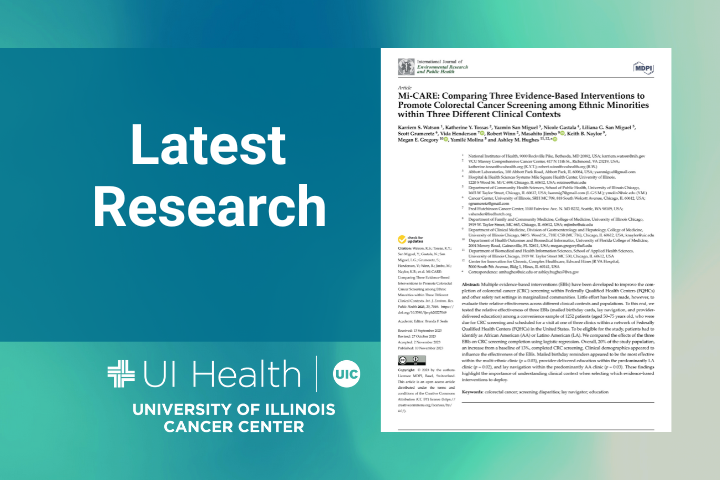
Colorectal cancer screening is a critical tool in catching this treatable disease earlier and saving lives. Yet screening rates remain low, particularly among Black and Latino Americans, due to lack of accessibility and barriers such as mistrust in the health care system. In Chicago, for example, roughly 23% of Latino and 36% of Black residents have had a screening, compared with 38% of white residents.
A recent study from University of Illinois Chicago researchers, including University of Illinois Cancer Center members, and colleagues looked at which interventions were most effective at boosting screening rates among the diverse patient population at UI Health’s Mile Square Health Center, a network of federally funded community clinics. They found that different tools worked better depending on the racial makeup of the specific clinic, but overall, the rate of colorectal screenings increased during the study. Their paper is published in the Journal of Environmental Research and Public Health.
The study was conducted at three of Mile Square’s clinics — one that serves mostly Black patients, one that serves mostly Latino patients and one that is multi-ethnic. Mile Square primarily serves marginalized communities as a safety net provider.
Patients 50 to 75 years old were offered one of three different services that encouraged them to receive screening for colorectal cancer. They either received a postcard around their birthday reminding them to get screened; met with a nonclinical staff member, known as a lay navigator, who shared the same racial or ethnic background as the patient and who provided education and helped set up an appointment if desired; or received education from their primary care provider, who helped set up an appointment if desired.
All three of these services have been previously shown to be effective in boosting rates of screening within safety net settings.
The researchers then tracked which patients completed a screening for colorectal cancer in the following 12 months. They found that, overall, 20% of patients were screened within the subsequent year, compared to 13% of comparable Mile Square patients who did not participate in the study.
But, the effectiveness of the three options differed by clinic. The mailed birthday reminders were most effective with patients at the multi-ethnic clinic, lay navigation was most effective in the predominately Black clinic, and provider-delivered education was most effective at the predominately Latino clinic.
“This study goes to show that there is not a ‘one-size-fits-all’ approach to tackling health disparities. We should be selecting and tailoring interventions according to patient needs,” said Cancer Center member Ashley Hughes, PhD, senior author and assistant professor of biomedical and health information sciences at UIC’s College of Applied Health Sciences.
Read more about the study in UIC Today.
Colorectal Cancer Prevention Initiative
This study is foundational to an emerging, large-scale initiative on CRC prevention – the Illinois Advancing Cancer Control Equity Research Through Transformative Solutions (I-ACCERT) Center. Cancer Center researchers have applied to the National Cancer Institute for $11.8 million to create the I-ACCERT Center, which builds on decades of multilevel interventions to improve cancer screening and survivorship in the Chicagoland area. The Center will focus on an understudied CRC priority – risk reduction and prevention. The Center’s transdisciplinary collaboration would compare the relative impacts of individual, team, organizational and policy interventions on reducing food insecurity and CRC risks among African American FQHC patients.
In addition to Hughes, other Cancer Center member authors Mile Square Health Center Senior Director of Research, Behavioral Health and Addiction Nicole Gastala, MD; UI Health gastroenterologist Keith Naylor, MD; Masahito Jimbo, MD, PhD, Department Head and Professor of Family and Community Medicine; and Associate Director for Community Outreach and Engagement Yamile Molina, PhD. All are part of the Cancer Prevention and Control Research Program at the Cancer Center.
Study authors also include former Cancer Center Director Robert Winn, MD, now Director of the VCU Massey Comprehensive Cancer Center, and former Cancer Center Associate Director for Community Outreach and Engagement Karriem Watson, DHSc, MS, MPH, now Chief Engagement Officer for the All of Us Research Program at the National Institutes of Health.
